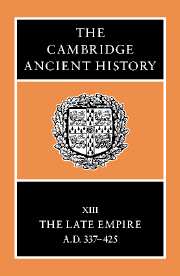Book contents
- Frontmatter
- PART I CHRONOLOGICAL OVERVIEW
- PART II GOVERNMENT AND INSTITUTIONS
- PART III THE EMPIRE: ECONOMY AND SOCIETY
- PART IV FOREIGN RELATIONS AND THE BARBARIAN WORLD
- PART V Religion
- 18 Polytheist religion and philosophy
- 19 Orthodoxy and heresy from the death of Constantine to the eve of the first council of Ephesus
- 20 Asceticism: pagan and Christian
- 21 Christianization and religious conflict
- PART VI ART AND CULTURE
- BIBLIOGRAPHY
- Index
- Map 1: The Roman empire in the late fourth century a.d.
- Map 2: Gaul and the German frontier
- Map 3: The Balkans and the Danube region
- Map 6: Asia Minor and the eastern provinces
- References
20 - Asceticism: pagan and Christian
from PART V - Religion
Published online by Cambridge University Press: 28 March 2008
- Frontmatter
- PART I CHRONOLOGICAL OVERVIEW
- PART II GOVERNMENT AND INSTITUTIONS
- PART III THE EMPIRE: ECONOMY AND SOCIETY
- PART IV FOREIGN RELATIONS AND THE BARBARIAN WORLD
- PART V Religion
- 18 Polytheist religion and philosophy
- 19 Orthodoxy and heresy from the death of Constantine to the eve of the first council of Ephesus
- 20 Asceticism: pagan and Christian
- 21 Christianization and religious conflict
- PART VI ART AND CULTURE
- BIBLIOGRAPHY
- Index
- Map 1: The Roman empire in the late fourth century a.d.
- Map 2: Gaul and the German frontier
- Map 3: The Balkans and the Danube region
- Map 6: Asia Minor and the eastern provinces
- References
Summary
In A.D. 360, Julian, then Caesar in Gaul and already a convinced polytheist, scanned the roads leading into Besançon in the hope of catching a glimpse of a figure wearing the unmistakable dark cloak of a philosopher – his mentor, Maximus of Ephesus (Jul. Ep. 8). Only a few years before, immediately after the death in Egypt of the great Christian hermit in 356, the Life of Antony had appeared in Greek. It enjoyed instant success throughout the Roman world. By 370, a Latin translation existed, and was soon available in Gaul, being read by a group of ascetics settled in a cottage outside Trier (Aug. Conf. VII. 6.15). Henceforth in Gaul, as elsewhere, the roads would never lack their share of Christian monks – austere, instantly recognizable figures. Later in the century, when passing through the Touraine, the horses of an imperial coach shied at the sight of a traveller striding alongside them ‘in a shaggy tunic, with his black cloak flapping’ – St Martin of Tours visiting the country churches of his diocese (Sulp. Sev. Dial. 11.3).
In many provinces, Christian and non-Christian ascetics eyed each other with curiosity and, frequently, with unconcealed disapprobation. When, in the 340s, a party of monks arrived at Panopolis to found a monastery outside the city, the local philosophers came out to warn them that they were bringing ‘olives to Panopolis’, coals to Newcastle: Panopolis already boasted possessors of an austere and ancient wisdom (Vita Pachomii Graeca 82).
- Type
- Chapter
- Information
- The Cambridge Ancient History , pp. 601 - 631Publisher: Cambridge University PressPrint publication year: 1997
References
- 2
- Cited by

